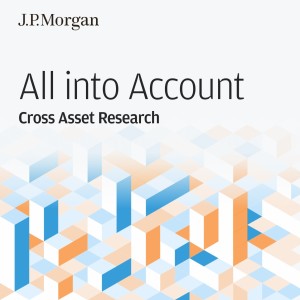
Speaker: Mislav Matejka, Head of Global Equity Strategy.
Q3 reporting season is coming up. While EPS revisions have been incredibly resilient so far, with Eurozone earnings for 2022 net revised up 12% ytd, UK up 33%, and US net flat, earnings are finally likely to see some weakness in Q3, and onwards, as PMIs are in contraction territory. There is a gap now between activity levels and analyst projections. FX makes a big difference regionally, where in Europe weaker currency helps exporters, while the US will see a headwind. We expect continued PMI weakness, driven by our lead indicator, real M1, with a base case of a Eurozone recession starting in Q4, which will result in earnings contraction. We hold -10% EPS growth projection for Europe in 2023. If realized, this would imply a meaningfully milder move in forward EPS by consensus from peak to trough, versus the typical 20-40% drawdown seen in past downturns in key regions. Why could European earnings hold up better than typical in the upcoming recession? 1. Stronger topline growth this time around, and earnings remain nominal variables. 2. Less delinquency risk, and fewer recapitalizations likely, which are typically heavily earnings dilutive. There is no need for a protracted balance sheet recession, or sustained falls in house prices, given that there is not much housing inventory in US or Europe. 3. Geopolitics is a wild card, with a risk of further escalation, but we don’t expect forced shutdowns this winter, as gas storages are full, and more LNG is coming in – Eurozone natural gas prices are now down more than 50% from August highs. We anticipate continued government intervention to shield consumers and industry from the bulk of the energy price spike. 4. FX is a big tailwind for European earnings this time around. Of course, for the US the FX is working negatively, but our economists still don’t have recession as a base case in the US. Notably, the gap has opened up between US and European equity prices and earnings, both in lc and in USD. 5. China has been countercyclical to US & Europe in the last two years, showing significant weakness. For 2023, it could stay countercyclical, but this time become more of a tailwind for growth given the easy hurdle rate, just as Europe is in a recession.
This podcast was recorded on 17 October 2022.
This communication is provided for information purposes only. Institutional clients can view the related report at https://www.jpmm.com/research/content/GPS-4232065-0 for more information; please visit www.jpmm.com/research/disclosures for important disclosures. © 2022 JPMorgan Chase & Co. All rights reserved.
More Episodes
 2023-10-24
2023-10-24
 548
548
 2023-10-20
2023-10-20
 1.1k
1.1k
 2023-10-09
2023-10-09
 816
816
 2023-10-02
2023-10-02
 582
582
Create your
podcast in
minutes
- Full-featured podcast site
- Unlimited storage and bandwidth
- Comprehensive podcast stats
- Distribute to Apple Podcasts, Spotify, and more
- Make money with your podcast
It is Free
- Privacy Policy
- Cookie Policy
- Terms of Use
- Consent Preferences
- Copyright © 2015-2024 Podbean.com





